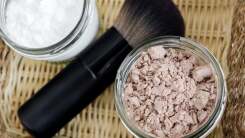Does Powder Sunscreen Actually Work?

Sunscreen does a great job of protecting our skin from rays that can cause skin cancer, as well as thickening and wrinkling of the skin as we age. But it also feels kind of greasy and goopy sometimes, especially when applied to the face, leaving many of us wondering if there might not be a better way to apply it. Sunscreen powders sound like a promising development. But do they work?

$19.99
What is powder sunscreen?
Sunscreens usually come in a lotion or spray format, but you can also find them in powder form. These products often come in a container with a built-in brush (kind of like a big floofy foundation brush) and tend to be more expensive than traditional sunscreens.
They’re sometimes marketed alongside makeup, so you can use them as a setting powder with the extra benefit of SPF. Sometimes they’re marketed toward parents of young kids, as an alternative to getting little ones to sit still for a lotion or spray application.
The ingredients are still legit sunscreens, and are typically mineral-based, with something like zinc oxide as the main active ingredient.
Powder sunscreen isn’t effective on its own
Ultimately, the problem with any form of sunscreen is that you need to apply a lot of it to get the protection listed on the label—and you need to reapply it according to the directions, which usually means every two hours. A sunscreen lotion is the easiest to apply this way, even though most of us don’t come anywhere near meeting the recommended amounts. (That’s okay, though—if the SPF is high enough, we still get decent protection.)
That brings us to the problem with nontraditional sunscreens. Are you really going to apply enough of it that it can actually work as intended? This is especially unlikely when it comes to combination products. Will you really slather on a thick layer of sunscreen-infused bug spray every two hours? How about a thick layer of SPF-containing foundation?
I think you see where I’m going. Are you going to apply enough powder sunscreen to get the protection you’re looking for, and then reapply it when it’s time? It’s unlikely, especially if the powder is your main form of sunscreen. Below is a video of chemist Michelle Wong applying sunscreen powder to her hand to show how much you would need to get the labeled SPF.
window.videoEmbeds = window.videoEmbeds || []; window.videoEmbeds.push({
elemId: ‘video-container-XidXjAD53BU’,
data: {“slug”:”XidXjAD53BU”,”start_time”:null,”url”:”https://www.youtube.com/watch?v=XidXjAD53BU”},
videoPlayerType: ‘in-content’
});
When powder sunscreens make sense
So you won’t be able to get the labeled protection from a comfortable layer of powder—does that mean sunscreen powder is useless? Here I must return to the one enduring rule of sun protection: The best sunscreen is the sunscreen you will wear. Powder sunscreens are a better-than-nothing option for reapplying sunscreen over your makeup, and many people will skip reapplying if they don’t have something that works on top of makeup.
Dermatologists recommend applying a layer of normal (cream) sunscreen first, then putting on your makeup; consider powder to be a tool for touch-ups. Unfortunately, it can’t be considered a replacement for your primary sunscreen.
Similarly, for kids, if powder is truly the only way you can get some sunscreen on your squirmy toddler, then a powder is better than nothing. But there are other ways to make sunscreen application easier on little ones—so don’t just buy a bottle of powder and consider the problem solved.



